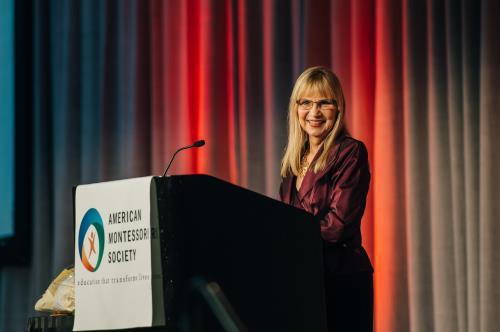I had the pleasure of interviewing Carolyn Kambich, recipient of the Northern Illinois University’s Alumni Association’s 2021 F.R. Geigle Service Award. Kambich’s energy and love of service work as a Montessori educator and administrator shine through all her life projects. As founder of the North Shore Montessori Schools in Illinois, Kambich shared her knowledge and spirit when asked to teach Montessori’s tenets to educators in Uganda. In 2016 she received the American Montessori Society’s Living Legacy Award.
Kambich began her Montessori journey in the 1960s after listening to a representative from the Midwest Montessori Training Center in Chicago. At the time, Kambich had taken a leave from public school teaching to stay at home with her three young children. The presentation stirred an intense curiosity about Maria Montessori’s child-centered methodology.
She tells how she found the state of Montessori education. “At that time, it was the mid-1960s and Montessori schools were just re-emerging. I became really interested in the philosophy behind Montessori schools and wondered what we could do with it for our own families and in our own community,” Kambich said (NIU Press Release, 10/1/2021).
She and a friend began to contact residents in their area asking if they would be interested in having a local Montessori school. Many were. Soon they gathered enough children for morning and afternoon sessions, and the Deerfield Montessori School opened in 1966 with 50 children.
“It was a good thing I was naïve, because I believed we could do it,” Kambich recalls. “We had no money. We had an ideal. We wanted this Montessori ideal for our children and the community.”
As the school became more established in the 1970s, parents began to inquire about full-day programs for their preschoolers. From there the school continued to grow. Today, North Shore Montessori has three sites with programs spanning all age groups from Infant & Toddler through Elementary.
During the late 1990s, a trip with her husband’s Winnetka’s Rotary Club led Kambich to meet Ugandan educators who, once they heard of Montessori education for peace, wanted to start schools in their country. This led to over a decade of visits to Uganda for the couple to assist with Montessori teacher training, development of facilities, and establish the Victoria Montessori Teacher Training Center in Uganda. They also worked with the Kampala Montessori School, also in Uganda.
The Kambichs continue to support post-high school scholarships for Ugandan children through the Child Restoration Outreach Support Organization (CROSO). Kambich remains active on the Peace and Social Justice Committee of the American Montessori Society, as well as the White Antiracist Discussion Group. In addition, Kambich gives time to Northern Illinois University in fundraising events. She and husband Tony established an endowment fund there, Education for Peace, in the College of Education.
The opinions expressed in Montessori Life are those of the authors and do not necessarily represent the position of AMS.


